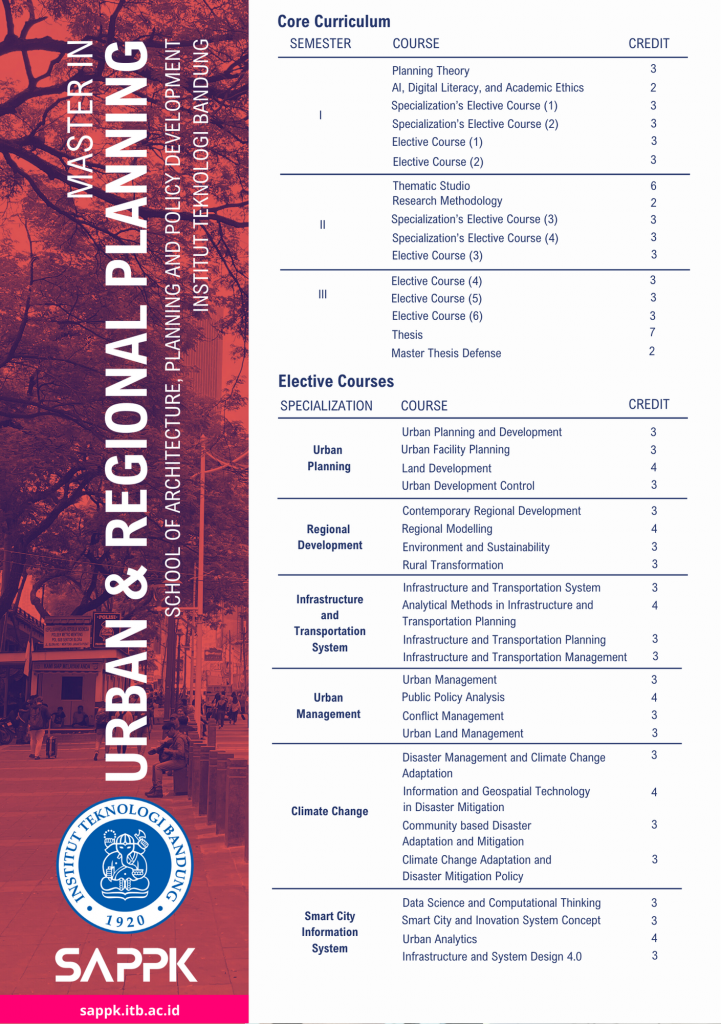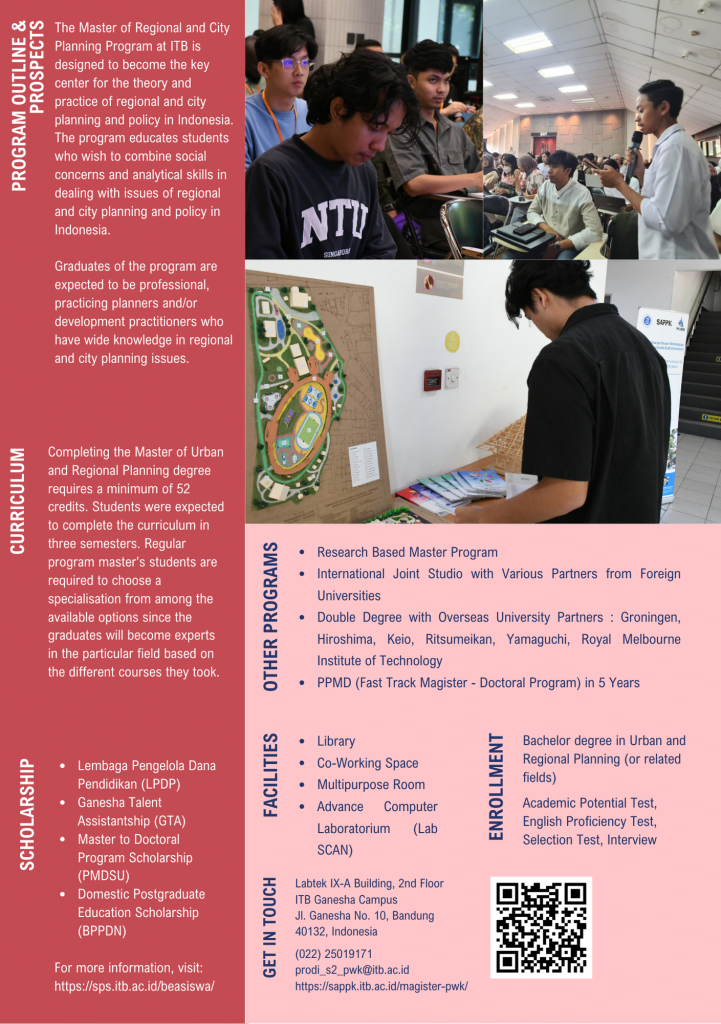Semester 1
| Code | Course Name | CU |
|---|---|---|
| PL5108 | Planning Theory | 3 |
| WI7001 | Literasi Digital, AI, & Etika Akademik | 2 |
| PL5122 | Contemporary Regional Development | 3 |
| PL6125 | Regional Modelling | 4 |
| PL5071 | Planning Research Ideas[1] | 3 |
Semester 2
| Code | Course Name | CU |
|---|---|---|
| PL6209 | Planning Thematic Studio | 6 |
| PL5208 | Research Methodology | 3 |
| PL6223 | Rural Transformation | 3 |
| PL5223 | Environment and Sustainability | 3 |
| PL6201 | Magang Riset Perencanaan[1] | 3 |
Semester 3
| Code | Course Name | CU |
|---|---|---|
| PL6073 | Planning Research Progress [1] | 3 |
Semester 4
| Code | Course Name | CU |
|---|---|---|
| PL6092 | Sidang Magister | 2 |
| PL6091 | Thesis [2][1] | 7 |
Semester 1
| Code | Course Name | CU |
|---|---|---|
| PL5108 | Planning Theory | 3 |
| WI7001 | Literasi Digital, AI, & Etika Akademik | 2 |
| PL5112 | Urban Development Planning | 3 |
| PL5113 | Urban Facilities Planning | 3 |
| PL5071 | Planning Research Ideas[1] | 3 |
Semester 2
| Code | Course Name | CU |
|---|---|---|
| PL6209 | Planning Thematic Studio | 6 |
| PL5208 | Research Methodology | 3 |
| PL6215 | Land and Housing Development | 4 |
| PL6201 | Magang Riset Perencanaan[1] | 3 |
Semester 3
| Code | Course Name | CU |
|---|---|---|
| PL6117 | Urban Development Control | 3 |
| PL6073 | Planning Research Progress [1] | 3 |
Semester 4
| Code | Course Name | CU |
|---|---|---|
| PL6092 | Sidang Magister | 2 |
| PL6091 | Thesis [2][1] | 7 |
Semester 1
| Code | Course Name | CU |
|---|---|---|
| PL5108 | Planning Theory | 3 |
| WI7001 | Literasi Digital, AI, & Etika Akademik | 2 |
| PL5152 | Disaster Mitigation Planning Disaster Management and Adaptation to Climate Change | 3 |
| PL6155 | Teknologi Informasi dan Geo-Spasial untuk Mitigasi Bencana | 4 |
| PL5071 | Planning Research Ideas[1] | 3 |
Semester 2
| Code | Course Name | CU |
|---|---|---|
| PL6209 | Planning Thematic Studio | 6 |
| PL5208 | Research Methodology | 3 |
| PL5253 | Adaptasi dan Mitigasi Bencana Berbasis Komunitas | 3 |
| PL6201 | Magang Riset Perencanaan[1] | 3 |
Semester 3
| Code | Course Name | CU |
|---|---|---|
| PL6153 | Kebijakan Mitigasi Bencana dan Adaptasi Perubahan Iklim | 3 |
| PL6073 | Planning Research Progress [1] | 3 |
Semester 4
| Code | Course Name | CU |
|---|---|---|
| PL6092 | Sidang Magister | 2 |
| PL6091 | Thesis [2][1] | 7 |
Semester 1
| Code | Course Name | CU |
|---|---|---|
| PL5108 | Planning Theory | 3 |
| WI7001 | Literasi Digital, AI, & Etika Akademik | 2 |
| PL5132 | Infrastructure and Transportation Systems | 3 |
| PL6135 | Transportation and Infrastructure Analytical Methods | 4 |
| PL5071 | Planning Research Ideas[1] | 3 |
Semester 2
| Code | Course Name | CU |
|---|---|---|
| PL6209 | Planning Thematic Studio | 6 |
| PL5208 | Research Methodology | 3 |
| PL6233 | Infrastructure and Transportation Planning | 3 |
| PL6201 | Magang Riset Perencanaan[1] | 3 |
Semester 3
| Code | Course Name | CU |
|---|---|---|
| PL6133 | Infrastructure and Transportation Management | 3 |
| PL6073 | Planning Research Progress [1] | 3 |
Semester 4
| Code | Course Name | CU |
|---|---|---|
| PL6092 | Sidang Magister | 2 |
| PL6091 | Thesis [2][1] | 7 |
Semester 1
| Code | Course Name | CU |
|---|---|---|
| PL5108 | Planning Theory | 3 |
| WI7001 | Literasi Digital, AI, & Etika Akademik | 2 |
| PL5162 | Computational Thinking and Data Science | 3 | PL5163 | Concept of Innovation System and Smart Cities | 3 |
| PL5071 | Planning Research Ideas[1] | 3 |
Semester 2
| Code | Course Name | CU |
|---|---|---|
| PL6209 | Planning Thematic Studio | 6 |
| PL5208 | Research Methodology | 3 |
| PL6265 | Urban Analytics | 4 |
| PL6201 | Magang Riset Perencanaan[1] | 3 |
Semester 3
| Code | Course Name | CU |
|---|---|---|
| PL6163 | System Design and Infrastructure 4.0 | 3 |
| PL6073 | Planning Research Progress [1] | 3 |
Semester 4
| Code | Course Name | CU |
|---|---|---|
| PL6092 | Sidang Magister | 2 |
| PL6091 | Thesis [2][1] | 7 |
Semester 1
| Code | Course Name | CU |
|---|---|---|
| PL5108 | Planning Theory | 3 |
| WI7001 | Literasi Digital, AI, & Etika Akademik | 2 |
| PL5142 | Urban Governance | 3 |
| PL6145 | Public Policy Analysis | 4 |
| PL5071 | Planning Research Ideas[1] | 3 |
Semester 2
| Code | Course Name | CU |
|---|---|---|
| PL6209 | Planning Thematic Studio | 6 |
| PL5208 | Research Methodology | 3 |
| PL5243 | Conflict Management | 3 |
| PL6243 | Urban Land Management | 3 |
| PL6201 | Magang Riset Perencanaan[1] | 3 |
Semester 3
| Code | Course Name | CU |
|---|---|---|
| PL6073 | Planning Research Progress [1] | 3 |
Semester 4
| Code | Course Name | CU |
|---|---|---|
| PL6092 | Sidang Magister | 2 |
| PL6091 | Thesis [2][1] | 7 |
|
CAREER and PROFESSIONAL MEMBERSHIP
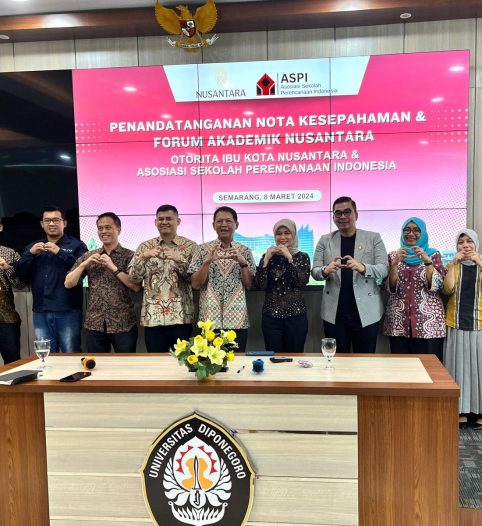
Career Opportunity
Graduates with a master’s degree in Urban and Regional Planning (MPWK) are qualified to work in local and regional councils, as well as in development agencies in public and private sectors.
Professional Membership
Graduates of this degree are eligible to become member of ITB Alumni Association (IA ITB) and apply for membership to the Indonesian Planners Association (Ikatan Ahli Perencana Indonesia).
Co- and Extra-Curricular
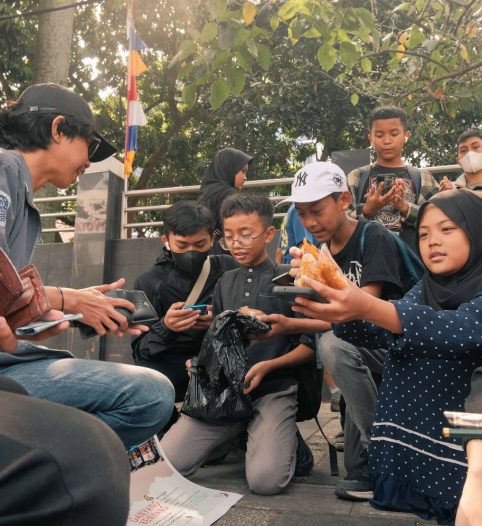
Student Affairs
There are some regular programs which are selected as a part of co and extra-curricular activities whereas students are involved and develop their soft skills, including leadership, teamwork, emphaty and initiative attitude, problem solving, and many more. These programs are designed with a multidisciplinary concept which involves multiple stakeholders including Student Association of UPURP (HMP Pangriptaloka).
Some of the regular programs:
- Summer Camp
- Summer school
- International Join Studio
- Join workshop
The Faculty also offers students the opportunity to be a Teaching Assistant or Research Assistant if they comply with several terms and conditions.
Scholarships and Fee Waivers
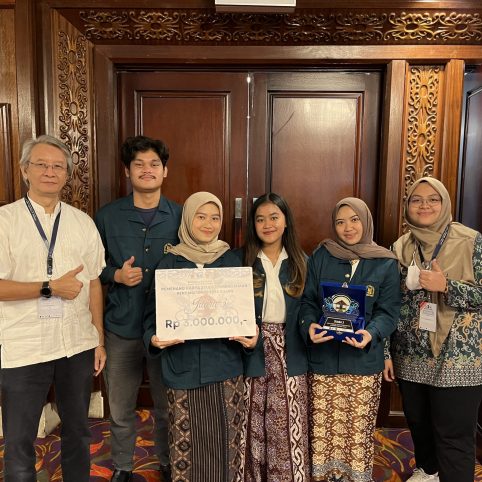
Skema Beasiswa
As an ITB graduate student, there are several scholarship schemes that can be applied for, through consideration of various provisions related to economic state and academic performance. Graduate students may apply for scholarships from ITB Graduate School (https://sps.itb.ac.id/), Student Parents Association (IOM), or from other institutions.
Scholarship informations from ITB Graduate School through Ganesha Talent Assistantship (GAT) scheme can be accessed at (https://sagata.itb.ac.id/)”
Head of Study Program
Ketua Program Studi Magister PWK:
Saut Aritua H. Sagala, ST., M.Sc., Ph.D.
saut.sagala@itb.ac.id
Contact
Program Studi Magister PWK
SAPPK-ITB
Gedung Sugijanto Soegijoko- Laboratorium Teknik (Labtek) IX-A
Jl. Ganesa 10, Bandung 40132, Indonesia
(022) 2504625 (p)
(022) 2500046 (f)
www.admission.itb.ac.id (w)



